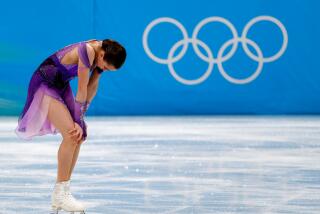NOTES : Drug Tests Might Use Samples of Blood
- Share via
COURCHEVEL, France — The chairman of the International Olympic Committee’s medical commission said Monday that blood instead of urine samples eventually might be used in drug testing at the Olympics, perhaps as soon as this summer at Barcelona.
Tests using blood samples are considered by laboratory analysts to be more accurate in detecting whether an athlete has used performance-enhancing drugs included on the IOC’s banned list.
“We are very close,” Prince Alexandre de Merode of Belgium said. “The test does exist. A month ago, it didn’t exist.”
The international skiing federation approved a test after the 1988 Winter Games at Calgary that requires an athlete’s blood to determine whether he or she has participated in the banned procedure of blood doping. That test was used at the 1991 world cross-country skiing championships, but blood has not been used in standard tests for drugs in sports.
Although the U.S. Olympic Committee has no formal position on such a test, some officials have expressed concern that athletes might consider the drawing of blood too invasive. Some, they said, also might have concerns about potential exposure to the AIDS virus.
“It has the potential to become controversial to some of our athletes and some of our sports bodies,” said Mike Moran, spokesman for the U.S. Olympic Committee.
A special IOC committee headed by vice president Keba Mbaye reported in December that there were no moral, legal or religious barriers to blood testing.
“I think it’s only natural to have reservations,” De Merode said. “But what is unacceptable one day might be acceptable the next if the reasons for doing it are quite sound.”
Three leading Australian track and field athletes declined to sign controversial contracts with the Australian Olympic Federation, threatening their participation in the Barcelona Games.
Marathon runners Rob de Castella and Lisa Martin Ondieki and walker Kerry Saxby all say the contract the AOC requires them to sign is in conflict with longstanding and legally binding sponsorship agreements they already hold.
“Nike has been sponsoring me for nine years,” Martin Ondieki said. The Australian team is sponsored by Adidas.
“A contract like the one the AOC is forcing us to sign is cutting our life blood and making it unattractive for sponsors,” Martin Ondieki said. “My solicitor has studied the contract and told me that it’s unreasonable. It’s a restriction of trade.
“I will be discussing the matter with Nike when I go to the United States in two weeks, and whether I participate in the Olympics or not will depend on what they say.”
Australian Olympic Committee president John Coates said athletes who did not sign the contract would not compete in the Olympics.
Organizers of the 1996 Summer Games in Atlanta presented their revised financial projections, with a smaller-than-expected surplus, to the International Olympic Committee.
The report says the cost of the Games will be almost $1.4 billion, compared to the original estimate of about $1 billion. Projected revenues are about $1.5 billion, up from the earlier estimate of $1.2 billion. The projected surplus is $132 million, down from the earlier figure of $157 million.
Billy Payne, president of the Atlanta Committee for the Atlanta Games, said the anticipated surplus was modest compared to the figure of $227 million for the 1984 Los Angeles Olympics. He added that the IOC Executive Board was pleased with the overall planning for the Games.
The Associated Press contributed to this report.
More to Read
Go beyond the scoreboard
Get the latest on L.A.'s teams in the daily Sports Report newsletter.
You may occasionally receive promotional content from the Los Angeles Times.






